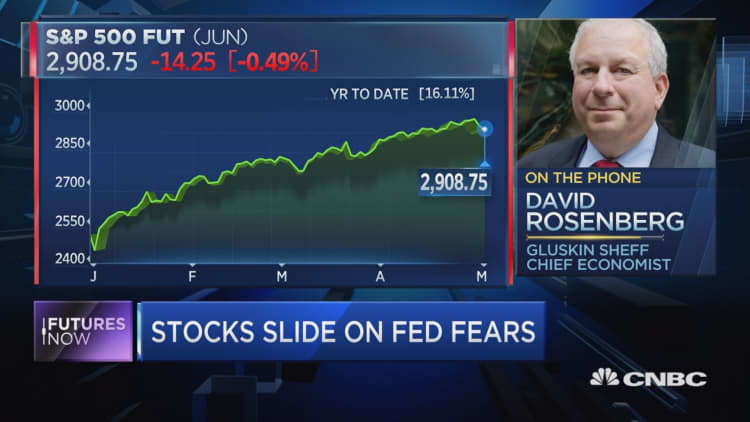
The man who said a 2019 recession was virtually unavoidable isn't backing down.
Stocks surged on Friday following a strong jobs report that showed unemployment at its lowest since 1969. The major indices are hovering near all-time highs.
But while Gluskin Sheff Chief Economist and Strategist David Rosenberg acknowledged that his call may have come a bit too soon, the risks in the U.S. economy are not to be ignored, he warned Thursday on CNBC's "Futures Now."
"People say, 'Well, I can't see the recession, I can't see the recession.' It's like saying, 'I can't smell the carbon monoxide,'" Rosenberg said. "I'm getting the same rhetoric and the same pushback and questions I was back in the latter part of 2006. Remember, the Fed stopped raising rates in 2006, and in 2007, by the tail end, we had a recession nobody saw coming."
Rosenberg's thesis hinges on both the Federal Reserve's recent series of interest rate hikes and what he called an "unprecedented" rate of publicly traded companies buying back their outstanding shares.
On the monetary policy side, Rosenberg noted that of the Fed's 13 tightening cycles since World War II, 10 have pushed the economy into a slowdown or a recession.
"More often than not, that degree of monetary restraint in the past has landed the economy in an economic downturn," he said. "The only question is whether it's in the second half of this year or the first half of next year, but I think that what investors have to know is that the business cycle's not dead and that a recession is out there probably sooner rather than later."
And although the next downturn probably won't look like the crisis-stricken period between 2007 and 2009, it won't be pretty, Rosenberg said. In fact, he said, it'll probably be fueled by his second major concern: The sheer abundance of share buybacks he's seen in recent years.
"I don't think it's going to be a deep recession, and it's not about the consumers or housing or the banks," he said. "It's really about these bloated corporate balance sheets. There will be a price to pay for the unprecedented debt-for-equity swap we did this cycle, borrowing at low interest rates and buying back your stock. That is certainly something that is not sustainable."
The market's rally to all-time highs also appears unsustainable to Rosenberg, who added that the bond market is already signaling a slowdown — and flashing signs that buyers should beware.
"The reason why bond yields have come down and the yield curve has flattened is because the bond market is actually saying growth is going to be slowing down over the course of the next year," Rosenberg said. "Bond yields always peak, by the way, before a recession starts, so the fact that we've peaked and come down is the bond market's way of telling the stock market, 'Caveat emptor.' And the bond market usually gets it right before the stock market does."



